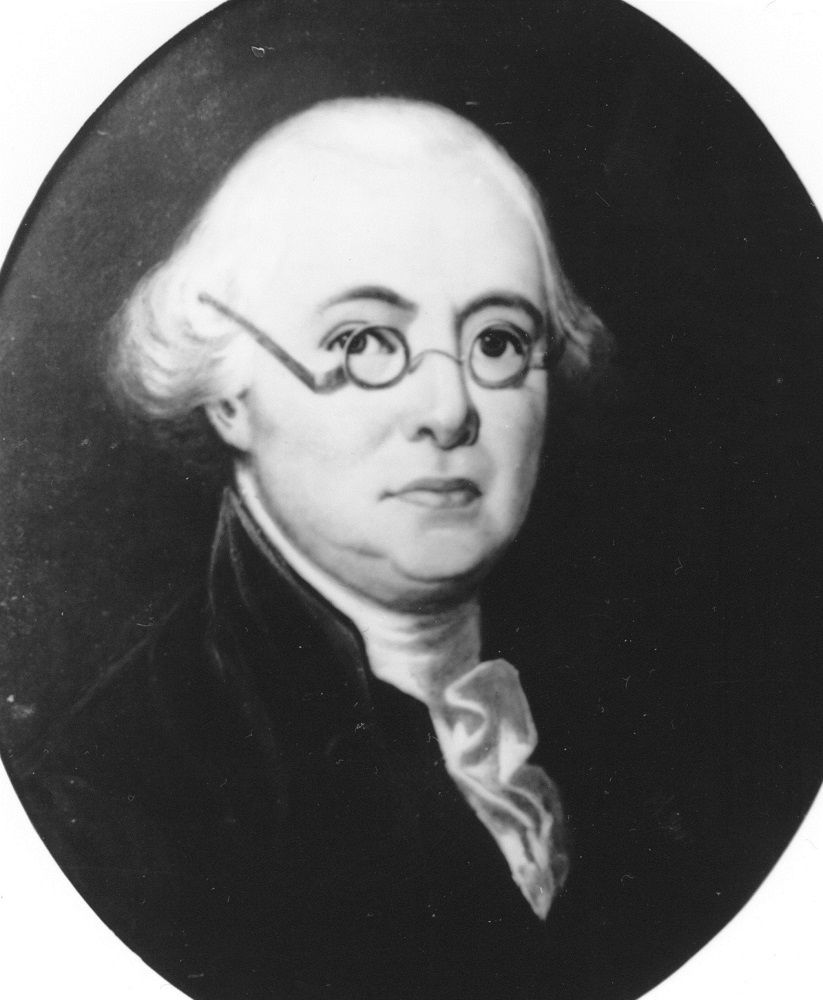Notable Gunsmiths of Cumberland County
The manufacture, or making by hand, of firearms (almost exclusively longrifles) dates to the era of British colonization and settlement of the Cumberland Valley.

James Wilson, signer of the Declaration of Independence (00289C).
George Ross (May 10, 1730—July 14, 1779) was born in New Castle, Delaware, the son of Rev. George and Catherine Van Gezel Ross, studied in Philadelphia, opened his law practice in Lancaster in 1751, and was named the King’s attorney for Cumberland County. Although he never moved to Cumberland County, he directed prosecutions regularly at the quarterly sessions of court at Carlisle from 1751 to 1762, and many pleadings and docket entry markings found in the county records are in his distinctive hand. After 1756 he was less involved in the county as the new war with the French and Indians made travel dangerous along with his new duty of the same kind in Lancaster, which continued until 1768, when he entered the provincial assembly. Increasingly active in the protest of the colonies against England, he was a member of both Continental Congresses. He affixed his signature to the Declaration, acted against adoption of the most radical measures, became assembly vice president in 1778, was made a state admiralty court judge in March 1779, and shortly before his death defied a reversal by Congress of his decision in the case of the seizure of the British sloop Active.1
James Smith (c.1719—July 11, 1806) was brought from Northern Ireland to Chester County, before later (about 1729) moving to what is now York County by his father. He then attended Rev. Allison’s school in Philadelphia and read law in Lancaster in the office of his brother George. On admission to the bar in 1745 he moved to the Shippensburg area to survey and practice law, but with the establishment of York County he moved to York, where he resided for the remainder of his life. Though he was the only lawyer in York until 1769, he was highly and regularly active in Cumberland County court sessions from their start in Shippensburg in April 1750 forward. His distinctive handwriting style shows his activity during this period. As the break with Britain approached he was a major actor in frontier protests and raised and was chosen Captain of a company which was expanded into a battalion with Smith as colonel. After serving in important bodies in Philadelphia he was placed on the committee to create a new government for Pennsylvania but soon was elected to the Continental Congress, in which he signed the Declaration. Although he was regarded as mildly eccentric he was valued for his conversation and wit, held many positions of high responsibility, and grew wealthy.2
James Wilson (September 14, 1742—August 21, 1798), a native of Scotland who arrived in New York in 1765, moved to Philadelphia, where he studied with John Dickinson, was admitted to the bar in 1767, and lived in Carlisle from 1769 to 1779. Here his practice grew to such an extent that he was involved in half the cases at the Cumberland County court, mostly involving land, and was attending the sessions of court in seven counties. At the famous First Presbyterian Church meeting of July 12, 1774, convened to protest the Intolerable Acts, he was made head of the county committee of correspondence, and though he was not an assemblyman, was sent as a delegate to the First Continental Congress, meanwhile gaining fame in America and in Europe for his writing. He was elected colonel of the 4th Battalion of Cumberland County associators on May 3, 1775, was elected to the Second Continental Congress, and signed the Declaration. His political position meanwhile had begun to shift rightward, and he opposed the state constitution of 1776. He moved from Carlisle to Philadelphia after the end of the British occupation of the city. A hard worker in Congress, he was sent to the Constitutional Convention, was a major influence on the drafting of the Constitution, and signed the document. President Washington appointed him an associate justice of the U.S. Supreme Court, and he took his seat there September 26, 1789. However his involvement in land and industry projects bankrupted him, causing him to flee first to New Jersey and finally to the home of Justice James Iredell at Edenton, North Carolina, where he died after a stroke following a bout with malaria.3
The manufacture, or making by hand, of firearms (almost exclusively longrifles) dates to the era of British colonization and settlement of the Cumberland Valley.
1Dictionary of American Biography 16:177-178; American National Biography 18:911-912; Edward W. Biddle, James Wilson, James Smith and George Ross, Three Signers of the Declaration of Independence Who Were Members of the Cumberland County Bar: Historical Address Delivered in the Court House, Carlisle, Pa., under the Auspices of the Carlisle Civic Club, on Friday Evening, April 4, 1902 (n.l., n.d. [1902]), 2-4, 8, 12-13, 19, 22-25.
2Dictionary of American Biography 17:283-284; Biddle, 2-5, 8, 11, 15-16, 19, 22, 25.
3Dictionary of American Biography 20:326-330; American National Biography 23:586-589; Biddle, 1-2, 5-8, 10-13, 17-20, 22, 25-27, 29-37.